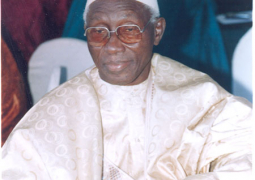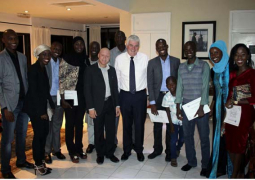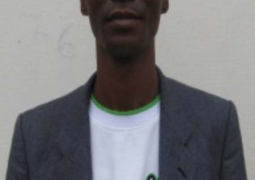As part of its strategic activities under the framework of United Nation Democracy Fund (UNDEF), two implementing partners of the UNDEF project, and West Africa Network for Peace building-Gambia (WANEP-Gambia)in collaboration with Forum for African Women Educationalist (FAWEGAM) and Pro-Hope International (PHIN), on 23 April 2012 started a four-day capacity building training forum for women and political party representatives held at the Agricultural Rural Farmers Training Centre in Jenoi in Lower River Region.
This campaign against women under representation in decision-making positions is a project being supported under the UNDEF project “enhancing women’s participation in democracy and decision making”.
The forum brought together over thirty women politicians from four main political parties, namely the APRC, the PDOIS, the UDP and the NRP across all the regions to discuss strategies, and harmonize efforts to increase women’s participation in political and decision-making position irrespective of their political lines.
Lamin Saidykhan, the principal investigative officer at the Ombudsman office, on behalf of the governor of LRR, underscored the importance of the forum, adding that women empowerment is key in national development.
Pamela Cole, National Network Coordinator for WANEP-Gambia, said her organization has provided a series of capacity building training for stakeholders and awareness creation for women in politics and most recently training is the mentorship programme.
The objective of the campaign is not about party lines but to device and strategise means to increase women participation in political positions and decision-making processes to represent the interest of Gambian women, not a particular party.
Ms Cole further revealed that the training attracted top women politicians from different political parties in various regions of the country came out boldly to speak out some of the issues limiting them from taking part in electoral processes or positions at community and national level.
According to her, some of the participants revealed that some of the factors limiting their participation are illiteracy, poverty, and shy/fear, lack of support from their colleagues, male dominated selection committees, domestic and family problems among others, to name a few, thus appeals formore support.
For her part, Michelle Jawo Demba, programme coordinator of Pro-Hope International, said Pro-Hope International is a civil society organization mainly focused on gender-based violence, women and youth reproductive health with occasional male involvement.
According to her, the UNDEF project is timely and has great impacts to the beneficiaries as far as enhancing women’s participation in decision-making processes are concern. Women participants has shown the need to come together regardless of partisan or ethnicity differences as far as women empowerment is concerned.
She said: “It is high time that women came forward and claimed their political rights in order to have equal representation in all decision-making positions for them to push their agenda forward for the interest of Gambia women.”
Mrs Jawo Demba said there is a great need to build and nurture Gambian women by raising their awareness on their political rights and education at all level on the policies and laws to address issues limiting them from assuming political and decision-making positions across the country.
Musa Sanneh, the URR focal person of WANEP-Gambia stated that the project is a two-year pilot project designed to target active women in politics from various political parties across the country to equip them with the knowledge and skills to effectively participate in democratic and political processes of The Gambia.
Sanneh noted that women are partners in development, as such there should be equal opportunities for all, urging them to remain united in their strives to achieve their political goals.
Julliet R. Lewis-Wakka, admin and financial officer of WANEP-Gambia, who also doubles as the moderator, said the workshop was held to increase women participation in political and decision-making processes, urging the women to be steadfast during the training.




